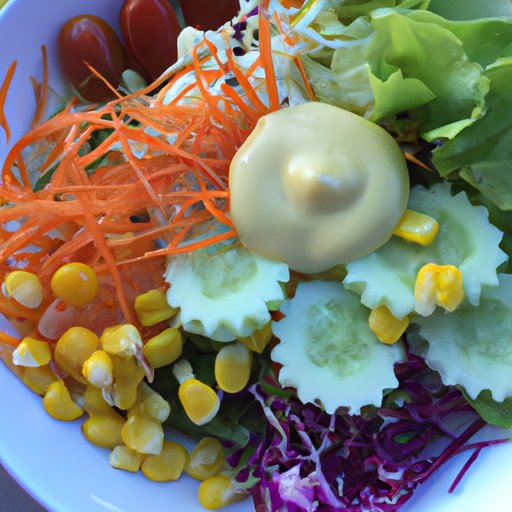
Introduction
Salads are considered a healthy addition to any diet. They are packed with vitamins, minerals, and fiber that are essential for maintaining good health. However, some people may experience constipation after eating a salad and wonder if the salad is the culprit. In this article, we will explore the science behind salads, digestion, and bowel movements to answer the question, “Does Salad Make You Poop?”
Health Benefits of Eating Salad
Salads are an excellent source of vitamins, minerals, and fiber. They can help improve overall health by reducing the risk of chronic diseases such as cancer, heart disease, and diabetes. The nutrient-dense vegetables and fruits in a salad provide essential nutrients that promote a healthy digestive system.
The Importance of Fiber in Your Diet
Fiber is an essential nutrient in our diet that plays a vital role in the digestive system. It helps regulate bowel movements, promotes a healthy gut microbiome, and reduces the risk of constipation, hemorrhoids, and diverticulitis. Vegetables in a salad provide ample fiber that is necessary for maintaining healthy digestion.
Does Salad Make You Poop?
The answer to the question “does salad make you poop?” is not as straightforward as it may seem. Salads can be a source of essential nutrients, including fiber that promotes healthy digestion. However, it is not the salad itself that causes bowel movements. The body’s digestive system is complex and influenced by various factors, including genetics, lifestyle, environment, and diet. While a salad may facilitate bowel movements, it does not cause them on its own.
Debunking Common Misconceptions about Digestion and Bowel Movement
There are several misconceptions about digestion and bowel movements that can lead to confusion and misinformation. For instance, many people believe that bowel movements need to occur daily, while others believe that skipping a bowel movement is a cause for concern. These are not necessarily true.
The frequency of bowel movements varies from person to person. The average person has one bowel movement per day, while others can have up to three or four. However, some people can have bowel movements less frequently and still have a healthy digestive system. Similarly, skipping a bowel movement occasionally is not a cause for concern.
How to Incorporate More Salads in Your Diet
Incorporating more salads into your diet can be an easy way to increase fiber intake and promote healthy digestion. Here are some tips for optimizing fiber intake for healthy digestion:
– Include a variety of vegetables in your salad, such as spinach, kale, cucumbers, carrots, and bell peppers.
– Use beans, chickpeas, or lentils to add protein and fiber to your salad.
– Top your salad with nuts or seeds for added crunch and healthy fats.
– Dress your salad with a healthy oil-based dressing that contains omega-3s.
Salad Recipes that can Improve Digestion
Here are some salad recipes that include ingredients known to promote digestive health:
1. Spinach and Chickpea Salad: Mix spinach leaves with cooked chickpeas, cherry tomatoes, red onion, and feta cheese. Dress the salad with olive oil and lemon juice.
2. Quinoa and Vegetable Salad: Cook quinoa and mix it with roasted vegetables such as zucchini, eggplant, and red peppers. Dress the salad with a mixture of olive oil and apple cider vinegar.
3. Asian Noodle Salad: Cook noodles and mix them with shredded carrots, cucumber, and chopped peanuts. Dress the salad with a mixture of soy sauce, rice vinegar, and sesame oil.
Conclusion
In conclusion, salads can be a healthy addition to any diet, and they can promote healthy digestion. While salads may facilitate bowel movements, they do not cause them on their own. Eating salad and incorporating more fiber-rich vegetables in your diet can help regulate bowel movements and prevent constipation. We encourage our readers to try out the tips, recipes, and information outlined in this article to maintain healthy digestion.




